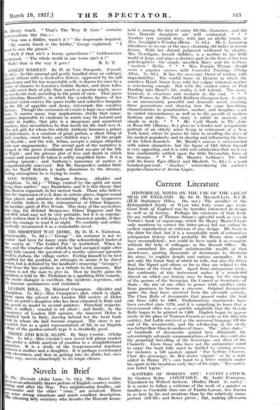GOBLIN MARKET. By H. de Vere Staepoole. (Cassell. 7 s , 6d.)—In
this unusual and gently handled story an ordinary decent citizen with a dead-alive history, oppressed by his tall grim house and his too respectable wife, is drawn for once by a series of chances to London's Goblin Market, and there takes an odd sweet fruit of pity that, much as passion might, saves or wrecks his soul, according to the point of view. That poem of Christina Rossetti's, in which the symbolic figures of her cloistral vision convey the queer traffic and seductive bargains in the life of appetite and desire, interwinds this sensitive history. Though the succession of events is kept on a subdued note, it. carries many true implications, chiefly that conse- quences impossible to vindicate in words may be natural and tender in reality, that pity is a dangerous and anarchical emotion, that nevertheless he that loseth his life shall save it. The sick girl, for whom the elderly Anthony becomes a prince of deliverance, is a creature of great pathos, a silent thing of little touches; sweet looks, and childish ways. All the people are likeable ; and the wife, Selina, accepts a unique situation with rare magnanimity. The second part of the narrative is steeped in the green woodlands and kind sea-airs of the Isle of Wight ; and the piteous plot of love and death in which rescuer and rescued lie taken is softly simplified there. It is a touching episode ; and Anthony's innocence of motive is sympathetically conveyed. But Mr. Staepoole's. sudden little plea for Tariff Reform is really disastrous to the dreamy, boding atmosphere he is trying to create.






























































 Previous page
Previous page